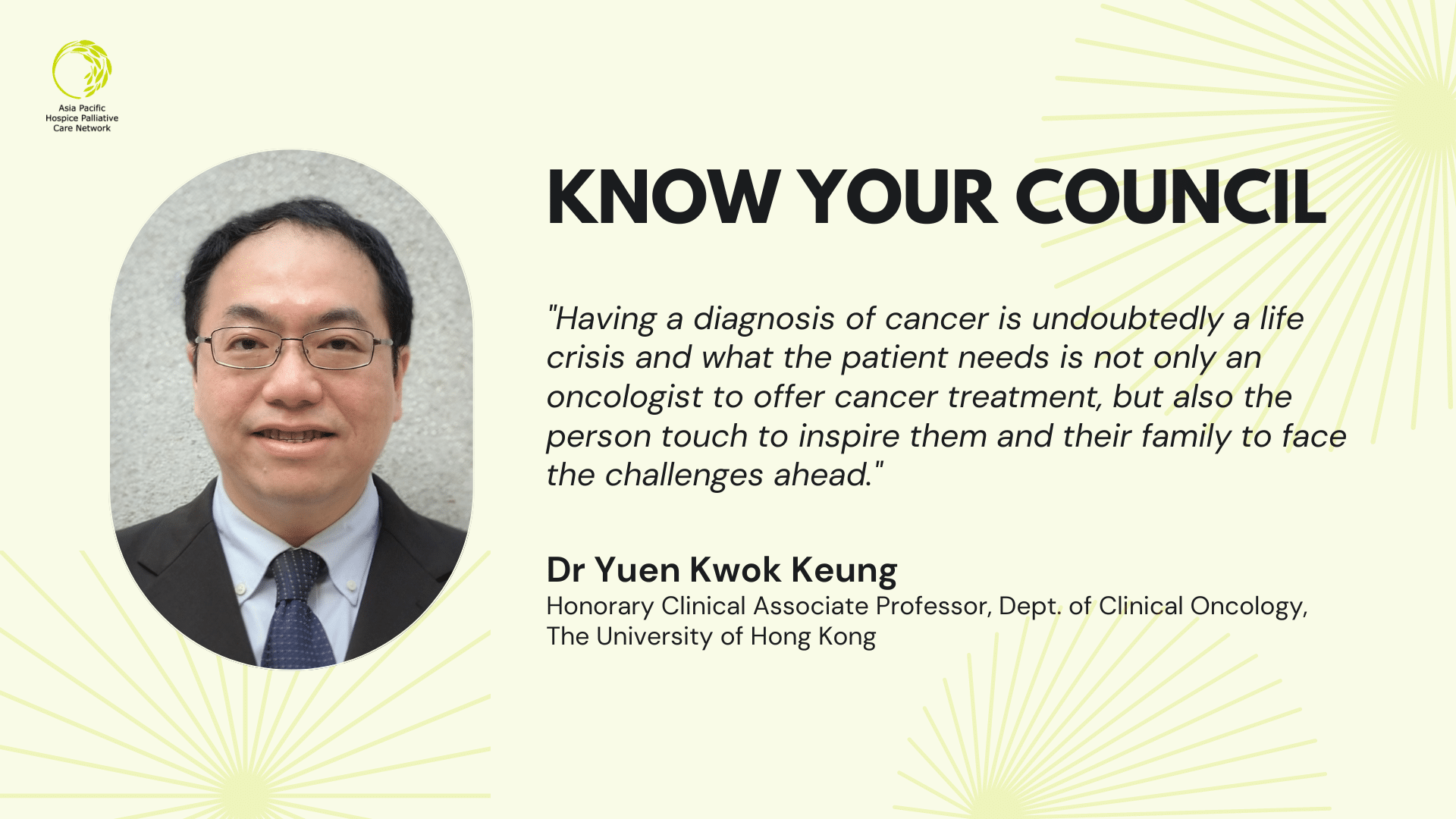
Dr Yuen Kwok Keung is the Honorary Clinical Associate Professor of the Department of Clinical Oncology of the University of Hong Kong. He is currently the Membership Committee Chair of the Asia Pacific Hospice Palliative Care Network, Vice President of the Hong Kong College of Radiologists and the Committee Member of the European Society of Medical Oncology (ESMO) Designated Centers Working Group.
Kindly share some insights into your background and the factors that led you to pursue a career in palliative care. What has motivated you to remain dedicated to this field?
I am a specialist in both clinical oncology and palliative medicine working in a teaching hospital of Hong Kong. I am also an accredited general mediator. I was born in a grassroot family and I never dreamt of being a doctor when I was young. Through the support from my family and teachers, I realized that adversity could be faced in a positive manner. For me, palliative care is more than a career. It is a process of exploration in life and learning through the experience of the patients and their family. Having a diagnosis of cancer is undoubtedly a life crisis and what the patient needs is not only an oncologist to offer cancer treatment, but also the person touch to inspire them and their family to face the challenges ahead. It is my dream to promote a holistic culture in the health care environment and the society as a whole.
Can you please describe your experience as a council member of the Asia Pacific Hospice Palliative Care Network? What are your key responsibilities in this role and how have you contributed to the development of palliative care in the region?
I have been a council member of the Asia Pacific Hospice Palliative Care Network for 4 years, serving as the Chair of the Membership Committee and the Lead of the China Training Steering Team Subcommittee. The Asia Pacific Hospice Palliative Care Network is a big family. Though members come from different regions with different cultures, they share common interest and passion in palliative care. One example is the Asia Pacific Hospice Palliative Care Conference, in which participants have the opportunity to enrich their professional knowledge and skills, and develop personal links with peers in the field. The development of palliative care in the region is a group process and I am pleased to contribute myself in promoting all those interested health care workers to join our network.
As the Lead of the China Training Steering Team Subcommittee, what strategies have you implemented to enhance training programs in the field of palliative care? How do you ensure that the training meets the specific needs and challenges faced in China?
Being the Lead of the Subcommittee is an exciting and challenging role. APHN has a good reputation and participants have high expectation in our training programs. As a Chinese myself, I understand the diversity of culture and palliative care service delivery in different regions and the need to address these in our training programs. At the same time, we need to keep our programs focused and practical. We are fortunate to have an experienced team of faculty and secretariat to support the implementation of the training programs as well as soliciting feedback from the participants. During the process we have identified local participants to assist teaching who also provided valuable feedback for future development of the programs.
The field of palliative care is constantly evolving. How do you stay updated with the latest developments and research in palliative care, and how do you translate this knowledge into practical strategies and initiatives within the network?
Since I am working in the oncology department of a teaching hospital, I have opportunity to participate in education and research in my institution, as well as participating in the ESMO Designated Centres Workgroup. I also have opportunity to attend education meetings organized by local and international professional organizations. I have participated in the webinars as well as the Advance Care Planning taskforce of the APHN. The diversity of membership allows APHN to have input by professionals coming from various backgrounds to share their experience on practical strategies in palliative care. To facilitate communication, I think we can make use of various means including APHN website, training courses and conferences like Asia Pacific Hospice Palliative Care Conference.
If you could travel back in time and meet any famous figure in the history of palliative care, who would it be and why? What questions would you ask them?
I would like to meet Dame Cicely Saunders because she is the founder of modern hospice. I had the chance to have a photo with her during my visit to St. Christopher’s Hospice in 1997 but I did not have chance to talk to her due to limit of time. If I had a chance to ask questions, I would like to ask what she values most in life and how to promote the holistic care of the person.
